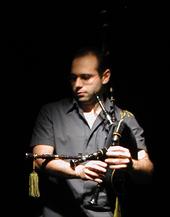Caros Amigos que me visitam,
O meu mais sincero pedido de desculpas pelo facto de me dirigir a todos vós, neste espaço da internet, em lÃngua inglesa e não na lÃngua mãe que amo – o português.
No entanto, o intuito de chegar ao maior numero possÃvel de pessoas, neste mundo que é o nosso, a bordo desta coisa a que chamam internet, a isso me obriga.
Cumprimentos, Gonçalo............................................................ ........................................................
Gonçalo Cruz was born in Oporto, in the northern portuguese coast in 1979. It was not until he reached 17, that an inexplicable desire to play the “Gaita de fole†emerged, from what had been a life of disregard for any kind of musical instrument. This urge proved as perplexing as it seemed impossible, as the feeble remains of the bagpipe tradition were far north, behind the Portuguese uplands or up by the border of the neighbouring Galicia.
Developing as a self-taught musician, he spent the last 10 years, studying the Portuguese bagpipe models (both the “Galician-Portuguese†and the “Transmontanaâ€). As a result, he founded the association “PortoCéltico – Study Group – Music from the North Atlantic†in 2003, where he promotes the study and development of the Portuguese musical traditions and where he has been a teacher since 2005.
He is also committed to bring back the portuguese “Gaita de fole†into the international music scene spotlights through his band “arrefoleâ€, in existence since 2002.
During his travels into Germany, for both teaching and performing, Gonçalo is devoted to promote Portugal as a country of undeniable bagpipe traditions.
Opposite to the common belief, the word “Gaita†does not exclusively refer to the Galician-variant of the bagpipe, yet it simply stands for a “monotonous or loud sounding instrument†(“Pipeâ€). In fact, the word “Gaita†is used for a great variety of musical instruments throughout the Iberian Peninsula, from single reed blown chanters to flutes, or even the hurdy-gurdy itself.
It is in fact the word “fole†(Bag) what defines the instruments - “Gaita de foleâ€. But even then, several bagpipes answer to that name in either Portugal or Spain.In Portugal, both the Galician-Portuguese model and the “Transmontanaâ€, are still traditionally played. Although being the oldest country in Europe, its bagpipes tradition trails even further into the past, which dilutes the specific nationality of the instrument. Therefore, speaking rigorously of Portuguese or Spanish “Gaitas†is naive, as musical instruments are free of language, flags or nations.
One can simply say that each of the two “Gaita de fole†correspond to a particular scale, fingering technique, repertoire and dances; most of the times, backed up by tenor and bass drum - In all, although part of two independent countries and 3 official languages, they are a true reflection of a region and its people’s culture.
............................................................
........................................................
